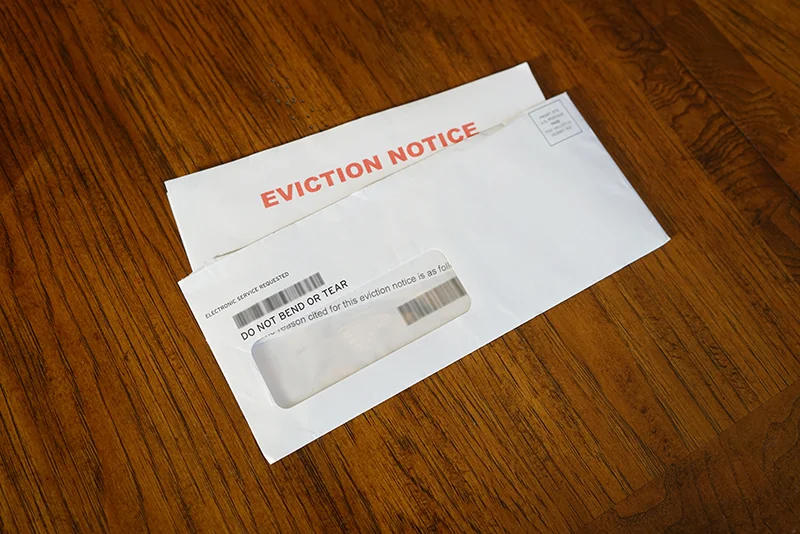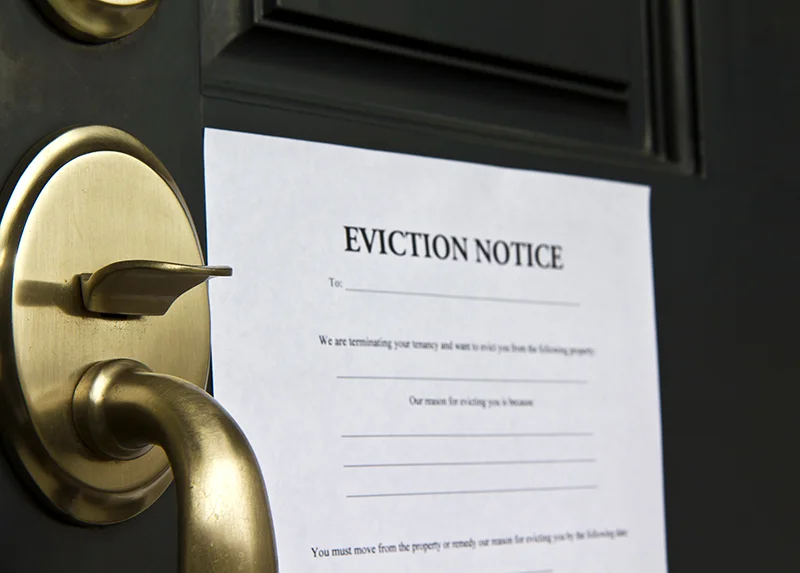How do property managers handle evictions? This is crucial for landlords seeking to protect their investments and maintain a healthy rental property portfolio. From serving the initial eviction notice to potentially filing an eviction lawsuit, every step must adhere to strict legal requirements, varying significantly by local law.
Eviction is a challenging and often emotionally charged aspect of property management. For property owners, navigating the complexities of tenant removal can be overwhelming, time-consuming, and fraught with legal pitfalls. This is precisely where professional property management companies like Rhino Property Management prove invaluable. We possess the expertise and understanding of how property managers handle evictions effectively, ensuring a lawful and streamlined process.

The Crucial Role of Property Managers in Evictions
Property managers act as a vital buffer between landlords and tenants during difficult situations, including eviction. Their primary role is to protect the property owner’s interests while ensuring all actions follow relevant local law and fair housing regulations.
How do property managers handle evictions efficiently?
- Understand and enforce lease terms: A solid lease agreement is the foundation of any successful tenancy. Property managers are experts in drafting and enforcing lease terms, which clearly outline tenant responsibilities and the consequences of breaches.
- Mitigate risk: By following proper procedures, property managers significantly reduce the risk of costly legal errors or retaliatory claims from tenants.
- Save time and stress: Evictions are time-consuming. Property managers handle all the paperwork, communication, and court appearances, freeing up the property owner’s time and reducing stress.
- Maintain professionalism: Evictions can be emotional. Property managers maintain a professional demeanor throughout the process, de-escalating tensions and focusing on legal compliance.
Do Property Managers Have the Authority to Evict?
A common question among landlords is whether their property manager has the legal authority to evict a tenant. The answer is generally yes, provided that this authority is clearly established within the Property Management Agreement between the property owner and the property management company.
In Utah, as in most states, property managers act as agents of the property owner. This means they are empowered to undertake actions on behalf of the owner, including initiating and carrying out eviction proceedings. The specific scope of this authority, however, is detailed in the contract you sign with your property management company.

Typically, a comprehensive Property Management Agreement will grant the property manager the right and authority to:
- Serve eviction notices: This includes drafting and delivering the appropriate eviction notice (e.g., Pay or Quit, Cure or Quit, or Unconditional Quit) according to local law and the lease agreement.
- File an eviction lawsuit: If the tenant fails to comply with the notice, the property manager is usually authorized to file an eviction lawsuit (unlawful detainer action) in court.
- Represent the owner in court: While they may not provide legal advice, property managers can typically represent the property owner in eviction hearings or coordinate with legal counsel if the case becomes complex.
- Coordinate with law enforcement: After a court order for possession is granted, property managers can work with the sheriff or constable to execute the writ of possession and regain control of the rental property.
It is essential for property owners to review their Property Management Agreement carefully to understand the extent of the authority granted to their property manager regarding evictions. This clarity ensures that when it comes time to handle evictions, the process is seamless and legally sound, without requiring constant direct involvement from the property owner.
The Eviction Process: How Do Property Managers Handle Evictions Step-by-Step?
The eviction process is a carefully orchestrated series of legal steps. Property managers are well-versed in these stages, ensuring adherence to all regulations.
1. Identifying the Grounds for Eviction
Before any action is taken, the property manager must establish legitimate grounds for eviction. Common reasons include:
- Failure to pay rent: This is one of the most frequent reasons for an eviction case.
- Violation of lease terms: This can include unauthorized occupants, pets, property damage, or engaging in illegal activities on the rental property.
- Holding over: When a tenant remains in the property after their lease agreement has expired and has not renewed.
- Serious property damage: Beyond normal wear and tear.
- Illegal activity: Engaging in criminal acts on the premises.
The property manager will carefully document all violations, gathering evidence such as communication logs, payment records, photographs, and witness statements. This meticulous documentation is critical should an eviction lawsuit become necessary.

2. Serving the Eviction Notice
Once grounds are established, the next critical step for property managers is to issue a formal eviction notice. This notice legally informs the tenant of the lease violation and the actions required to rectify it or vacate the property. The type of notice and the required timeframe vary significantly based on local law and the specific reason for eviction.
Common types of eviction notices include:
- Pay or Quit Notice: Used when a tenant has failed to pay rent. This notice gives the tenant a specific number of days (e.g., 3-5 days in many jurisdictions) to pay the overdue rent or vacate the premises.
- Cure or Quit Notice: Issued for other lease terms violations, such as having an unauthorized pet or excessive noise. This notice provides the tenant with a set period to “cure” (fix) the violation or move out.
- Unconditional Quit Notice: Reserved for serious or repeated lease agreement violations where the tenant is not given an option to fix the issue. Examples include severe property damage, illegal activity, or repeated late payments. The tenant is simply informed that they must vacate.
Property managers understand the precise requirements for serving these notices, including acceptable delivery methods (e.g., hand-delivery, certified mail, posting on the door) and the exact timeframes mandated by local law. Improper notice can invalidate the entire eviction process.
3. Filing an Eviction Lawsuit (Unlawful Detainer Action)
If the tenant fails to follow the eviction notice within the specified timeframe, the property manager will then proceed to file an eviction lawsuit, often referred to as an “unlawful detainer” action, in the appropriate court. This marks the formal start of the legal eviction case.
During this phase, property managers will:
- Prepare and file legal documents: This includes the complaint and summons, outlining the reasons for eviction and the requested relief (possession of the property, unpaid rent, damages).
- Arrange for proper service of process: The tenant must be legally served with the lawsuit documents. This is typically done by a sheriff, constable, or a professional process server.
- Attend court hearings: The property manager, or a legal representative working with the property manager, will attend all scheduled court hearings, presenting the documented evidence of lease agreement violations and adherence to proper procedures.

4. Court Proceedings and Judgment
During the court hearing, both the property manager (representing the property owner) and the tenant have the opportunity to present their case. The judge will review the evidence, hear testimony, and determine if eviction is legally justified.
If the court rules in favor of the property owner, a judgment for possession will be issued. This legally authorizes the property owner to regain possession of the rental property. In some cases, the judgment may also include an order for the tenant to pay back rent, damages, and legal fees.
5. Obtaining a Writ of Possession
Should the tenant still refuse to vacate the property after the judgment, the property manager will initiate the final legal step: obtaining a “writ of possession” (sometimes called a writ of restitution). This court order is then provided to local law enforcement (sheriff or marshal), who will physically remove the tenant from the rental property if they do not leave voluntarily.
It’s crucial to emphasize that property managers will never resort to “self-help” eviction tactics, such as changing locks, shutting off utilities, or removing a tenant’s belongings. Such actions are illegal and can lead to severe penalties for the property owner. The legal system must be followed precisely.
Key Considerations for Property Managers Handling Evictions
Beyond the step-by-step process, successful property managers incorporate several key considerations when dealing with evictions:
- Understanding State and Local Laws: Eviction laws can vary significantly from state to state and even city to city. Property management companies stay current on all relevant landlord-tenant laws, including specific notice periods, acceptable grounds for eviction, and court procedures. This ensures compliance and avoids costly delays or dismissal of the eviction case.
- Thorough Tenant Screening: The best way to reduce the likelihood of having to evict a tenant is through rigorous tenant screening. Property managers conduct comprehensive background checks, credit checks, rental history verification, and income verification to select reliable tenants who are likely to adhere to lease terms.
- Clear Lease Agreements: A well-drafted and legally sound lease agreement is an invaluable tool. It clearly defines the rights and responsibilities of both landlords and tenants, minimizing misunderstandings and providing a strong basis for legal action if lease terms are violated.
- Documentation, Documentation, Documentation: From the moment a tenant moves in until the keys are returned, property managers maintain meticulous records. This includes:
- Signed lease agreement and all addendums.
- Records of rent payments and any late fees.
- Communication logs (emails, texts, phone calls).
- Maintenance requests and resolutions.
- Inspection reports.
- Copies of all eviction notices and proof of delivery.
- Photographs or videos of property conditions. This documentation is vital evidence in an eviction lawsuit.
- Professional Communication: Even in contentious situations, property managers maintain respectful and professional communication with tenants. This can help de-escalate conflicts and, in some cases, lead to a resolution without requiring a full eviction lawsuit.
- Exploring Alternatives to Eviction: While knowing how property managers handle evictions is essential, they also explore alternatives when appropriate. These might include:
- Payment plans: For tenants facing temporary financial hardship, a structured payment plan for overdue rent might prevent the need for an eviction case.
- Cash for keys: In some situations, offering a tenant a monetary incentive to voluntarily vacate the property can be less costly and time-consuming than a lengthy eviction lawsuit.
- Mediation: For certain disputes, a neutral third-party mediator can help landlords and tenants reach a mutually agreeable solution.
- Post-Eviction Procedures: After an eviction, property managers handle the necessary steps to prepare the rental property for a new tenant, including:
- Securing the property.
- Coordinating property clean-out and repairs.
- Handling abandoned tenant property according to local law.
- Marketing and re-tenanting the unit to minimize vacancy loss.

Why Choose Rhino Property Management to Handle Evictions?
Rhino Property Management brings a wealth of experience and expertise to the challenging task of managing evictions. Our dedicated team understands how to handle evictions efficiently and legally, protecting your investment and peace of mind.
By partnering with Rhino Property Management, you benefit from:
- Expert Knowledge of Local Law: We are intimately familiar with Utah’s landlord-tenant laws and stay updated on any changes, ensuring all eviction process steps are compliant.
- Strategic Planning: We develop a clear strategy for each eviction case, aiming for the quickest and most cost-effective resolution while adhering to all legal requirements.
- Comprehensive Documentation: Our meticulous record-keeping provides the necessary evidence to support your position in an eviction lawsuit.
- Professional Representation: We handle all communications with tenants and, if necessary, work with legal professionals to represent your interests in court.
- Minimizing Vacancy and Costs: Our efficient processes are designed to minimize the time your rental property sits vacant, reducing lost income and associated expenses.
Entrusting your rental property to Rhino Property Management means having a skilled team on your side, capable of navigating even the most challenging aspects of tenancy, including how do property managers handle evictions. We are committed to safeguarding your assets and ensuring a positive experience for both landlords and tenants whenever possible. Don’t let the daunting prospect of eviction deter you from investing in real estate. With Rhino Property Management, you have a partner who understands the intricacies of the eviction process and is equipped to handle every step with professionalism and legal precision. Contact us today to learn more about our comprehensive property management services.

